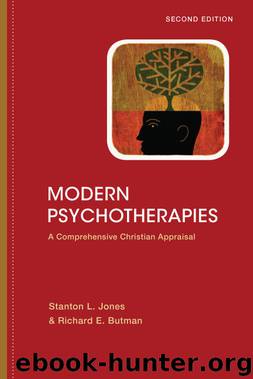Modern Psychotherapies: A Comprehensive Christian Appraisal by Stanton L. Jones & Richard E. Butman

Author:Stanton L. Jones & Richard E. Butman [Jones, Stanton L. and Butman, Richard E.]
Language: eng
Format: epub
Publisher: InterVarsity Press
Published: 2012-12-05T05:00:00+00:00
7
Person-Centered Therapy
Terri Watson, Stanton L. Jones and Richard E. Butman
It is especially difficult to get beyond mere intuitive and emotional appeal when evaluating person-centered therapy. Indeed, a counselor in this tradition would strike many as a good model of what it means to be a wise and patient friend, a person with an enormous capacity to listen attentively and respectfully. In a culture like ours where interpersonal contact and intimacy can be lost to absorption in the tasks of everyday living, few would find these qualities unattractive. Perhaps one reason why Carl Rogers’s theory and technique has been so warmly embraced within significant portions of the religious community is that it appears to give us valuable clues and guidance on how to respond to those in misery and distress, or how to concretely “love the brothers and sisters.”
While only a small percentage of clinicians practice from a purely person-centered perspective, over one-third of “eclectic” therapists integrate Rogers’s person-centered therapy and other experiential techniques with their orientation (Norcross & Prochaska, 1988, as cited in Bohart, 2003). During his career Rogers conceptualized what many believe to be the most comprehensive humanistic theory of personality (Bozarth, Zimring & Tausch, 2001). He is considered to be the father of psychotherapy outcome research (Bozarth et al., 2001), and his emphasis on the primary role of the therapeutic relationship in therapy outcomes has received wide support. Kirschenbaum and Henderson (1989) assert that Rogers is “the most influential psychologist in American History” (p. xi).
An ever-evolving approach since the early 1940s, humanistic and person-centered therapies have experienced a noticeable renewal of late as evidenced by the recent publication of two handbooks of humanistic therapy (Cain & Seeman, 2001; Schneider, Bugental & Pierson, 2001). The recent interest in empirically supported therapy relationships (Norcross, 2002), an attempt to counterbalance focus on empirically supported techniques (ESTs) in psychotherapy, had resulted in renewed interest in Rogers’s original “necessary and sufficient conditions” for the therapeutic relationship, and compels the Christian student of psychology to take another look at this important historical figure.
Download
This site does not store any files on its server. We only index and link to content provided by other sites. Please contact the content providers to delete copyright contents if any and email us, we'll remove relevant links or contents immediately.
Rewire Your Anxious Brain by Catherine M. Pittman(18643)
Talking to Strangers by Malcolm Gladwell(13347)
The Art of Thinking Clearly by Rolf Dobelli(10453)
Mindhunter: Inside the FBI's Elite Serial Crime Unit by John E. Douglas & Mark Olshaker(9320)
Becoming Supernatural by Dr. Joe Dispenza(8200)
Change Your Questions, Change Your Life by Marilee Adams(7759)
Nudge - Improving Decisions about Health, Wealth, and Happiness by Thaler Sunstein(7692)
The Road Less Traveled by M. Scott Peck(7594)
The Lost Art of Listening by Michael P. Nichols(7494)
Mastermind: How to Think Like Sherlock Holmes by Maria Konnikova(7323)
Enlightenment Now: The Case for Reason, Science, Humanism, and Progress by Steven Pinker(7306)
Win Bigly by Scott Adams(7184)
The Way of Zen by Alan W. Watts(6600)
Daring Greatly by Brene Brown(6502)
Big Magic: Creative Living Beyond Fear by Elizabeth Gilbert(5754)
Grit by Angela Duckworth(5604)
Ego Is the Enemy by Ryan Holiday(5413)
Men In Love by Nancy Friday(5234)
The Laws of Human Nature by Robert Greene(5172)
